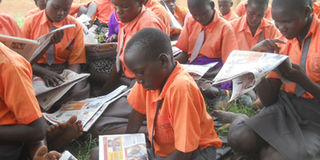NiE promotes independent reading

Students need to engage in activities that enhance the curriculum outside the classroom. File photo
The notion that Uganda has a poor reading culture is being challenged. Far from the belief that citizens are not interested in books, professionals in education are calling for different methods to tackle the problem, saying talk of a ‘poor reading culture’ is a myth.
The arguments for a better way to get children reading were presented at the reading tent organised by the Kampala Capital City Authority’s library, where children from the different divisions of the city participated in reading and writing activities.
The Newspapers in Education (NiE) programme run by Monitor Publications provided newspapers for use at the reading tent that was conducted from September 10 to 14.
The adage that readers are leaders was clear for those attending, an argument that is the core principle of NiE.
“We believe the problem is really because of a debilitating laziness on the part of those in charge of education,” Ms Annet Mpuuga, a teacher, said on the sidelines of the function.
“The children are not exposed to good literature since many administrators in schools are focusing on passing examinations.” Ms Mpuuga also believes the practice of demanding for accountability from teachers, especially for new books provided to use in the course of learning, limits the creativity that teachers could foster as a means to jumpstart self-discovery. “When you go to many of these primary schools, you might find some books in the libraries but you will find them locked up. Their newness shows they are not being used.”
According to her, the practice is usually that when inspectors visit schools, they want to know how many books were given to the institution and how many are still available.
Ms Mpuuga believes alternatives like newspapers, which encourage young readers to be inquisitive about their country and their world, would go a long way in bridging the reading gap.
“Reading and writing need to be encouraged from as early as possible,” Mr Jack Sserunkuuma, one of the facilitators at the tent told the gathering.
“As a child, you need to go with a journal or diary wherever you go to record the things you see. This will help you become a good story teller.”
Mr Sserunkuma also encouraged the more than 100 children, who had travelled from 10 schools in Kawempe Division on the first day of the tent, to be as creative as possible as they record events. “The more details you include, the better you will remember the facts when you report,” he said.
The tent came to a close on Friday. 10 schools from each of the five divisions of Kampala travelled to the Mayor’s Gardens on each of the five days. Central Division came last.
The activity also provided an opportunity for NiE to launch the new term’s activity, which is based on the celebration of Uganda’s 50th year of independence. This term is especially important on the programme since the day (October 9) falls within the school activities time frame.
Starting Monday, the new NiE term shall begin. The programme runs for eight weeks and stops just before schools start preparing for the final examinations. Schools that are sponsored by different corporate entities receive newspapers every Monday in the school term and children get to take the newspapers home.
The programme encourages teachers to use the newspaper as it has been endorsed as a living text book. According to MPL’s Brand Manager Sarah Nalule, the new term’s classroom activity is as exciting as participants have come to expect.
“As we celebrate our Independence, we want to show that young readers can get most of the information about Uganda from Daily Monitor. The activity will be engaging taking children back into the very fabric of what makes this country great,” Ms Nalule said.
“Children are being given a platform to explain in their own way what they expect their country to be like since they know they are stake holders in it too.”
NiE is supported by individuals who wish to support a school and by organisations. The sponsors, who have collectively reached more than 500,000 readers in Uganda, include ZOA Uganda, Hima Cement, World Vision Uganda and Child Fund International.



